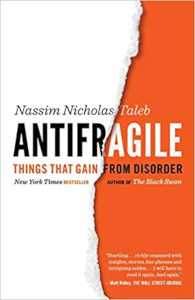Book recommendation: Antifragile
In the first of what may become a semi-regular feature of my daily list, I’m going to make a book recommendation. Regular readers likely already have a sense that I like find inspiration in unusual places, so I’m not recommending an IT-related book.
Antifragile: Things That Gain from Disorder by Nassim Nicholas Taleb provides an interesting look at systems that are antifragile. Taleb contrasts “antifragile” against the more intuitive concept of robustness or resiliance.
To explain briefly, a fragile system is one which breaks or fails easily under strain.
A robust or resiliant system has some amount of safeguard or protection against strain.
An antifragile system, in contrast, actually improves under strain.
One example of an antifragile system in the natural world is the human immune system—threats to the human body tend to improve the body’s ability to respond to future threats. The book offers commercial air travel as an industrial example—every airline accident prompts an in-depth investigation which leads to technological and policy improvements that result in a safer system overall.
I love this model, and find it to be great inspiration for IT systems. I think it’s well worth while to strive to make our IT systems antifragile, by responding to failures and problems in ways that consistently improve the system. And I don’t simply mean software. Software alone cannot really be antifragile. Antifragility becomes possible only when considering the IT system as a whole: software, hardware, and people, and their interactions by way of monitoring, on-call policy, retrospective and postmortem events, etc.




